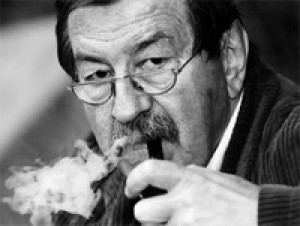Günter Wilhelm Grass was a Nobel Prize-winning German author and playwright. He was born in the Free City of Danzig (now Gdańsk, Poland). Since 1945, he lived in West Germany (now Germany), but in his fiction he frequently returned to the Danzig of his childhood. He came to be best known for his...
show more
Günter Wilhelm Grass was a Nobel Prize-winning German author and playwright.
He was born in the Free City of Danzig (now Gdańsk, Poland). Since 1945, he lived in West Germany (now Germany), but in his fiction he frequently returned to the Danzig of his childhood.
He came to be best known for his first novel, The Tin Drum, a key text in European magic realism. His works frequently have a strong left wing, socialist political dimension, and Grass was an active supporter of the Social Democratic Party of Germany. In 2006, Grass caused a controversy with his disclosure of Waffen-SS service during the final months of World War II.
Grass was born in the Free City of Danzig on 16 October 1927, to Willy Grass (1899-1979), a Protestant ethnic German, and Helene Grass (née Knoff, 1898-1954), a Roman Catholic of Kashubian-Polish origin. Grass was raised a Catholic. His parents had a grocery store with an attached apartment in Danzig-Langfuhr (now Gdańsk-Wrzeszcz). He had one sister, who was born in 1930.
Grass attended the Danzig Gymnasium Conradinum. He volunteered for submarine service with the Kriegsmarine "to get out of the confinement he felt as a teenager in his parents' house" which he considered - in a very negative way - civic Catholic lower middle class. In 1943 he became a Luftwaffenhelfer, then he was drafted into the Reichsarbeitsdienst, and in November 1944, shortly after his seventeenth birthday, into the Waffen-SS. The seventeen-year-old Grass saw combat with the 10th SS Panzer Division Frundsberg from February 1945 until he was wounded on 20 April 1945 and sent to an American POW camp.
In 1946 and 1947 he worked in a mine and received a stonemason's education. For many years he studied sculpture and graphics, first at the Kunstakademie Düsseldorf, then at the Universität der Künste Berlin. He also worked as an author and travelled frequently. He married in 1954 and since 1960 lived in Berlin as well as part-time in Schleswig-Holstein. Divorced in 1978, he remarried in 1979. From 1983 to 1986 he held the presidency of the Berlin Akademie der Künste (Berlin Academy of Arts).
show less

